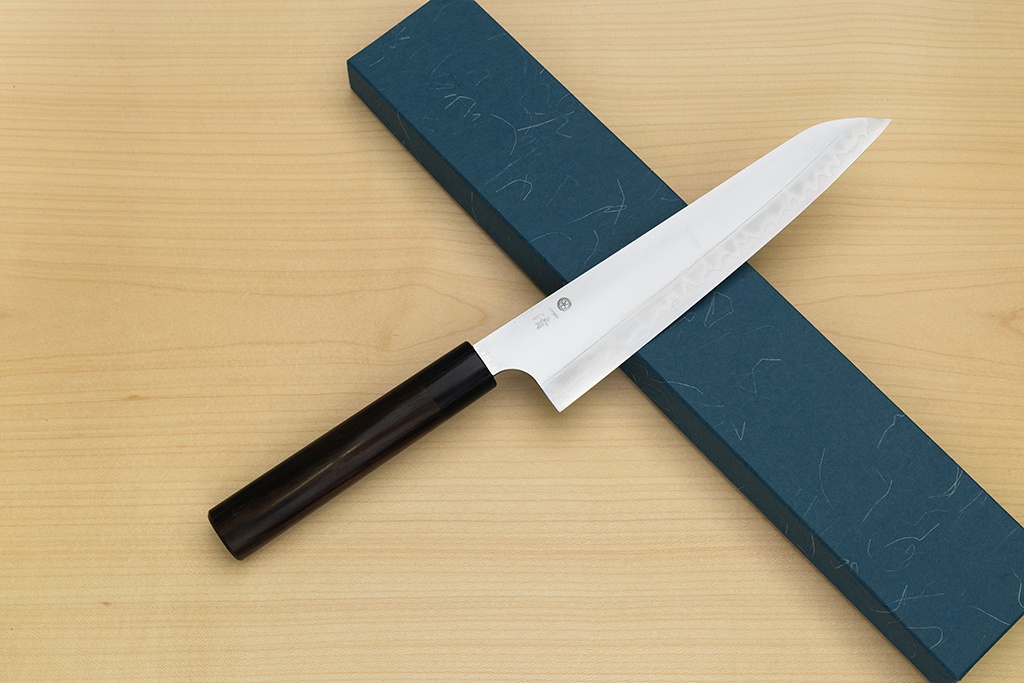Yoshizawa Blue steel 2 Gyuto knife 210mm (8.3") Rosewood handle
This beautiful Gyuto knife is made by a young and talented craftsman (blacksmith) from the Saitama Prefecture, Norifumi Yoshizawa. 210mm hand-forged, three-layer (san mai) blade made from Hitachi Metals Blue Steel 2 (Aogami#2) as the central core, sandwiched between two layers of softer stainless steel. Japanese traditional shape handle made from Rosewood.
This beautiful Gyuto knife is made by a young and talented craftsman (blacksmith) from the Saitama Prefecture, Norifumi Yoshizawa. 210mm hand-forged, three-layer (san mai) blade, made from Hitachi Metals Blue Steel 2 (Aogami#2) as the central core, sandwiched between two layers of softer stainless steel. Japanese traditional shape handle made from Rosewood. Yoshizawa developed his skills in the Tosa region under the patronage of the famous bladesmith Mr. Yoshihiko Akitomo (Rad Orca cutlery owner in the third generation). Tosa uchihamono (Tosa cutlery) is distinctive for free-forging in which knives shapes are formed by the precise hammering and flattening of hot metal. All Tosa knives forging and finishing processes are made by only one man (so Tosa artisans spend many years developing their skills). Yoshizawa believes knives are valuable only when they are used as a tool for daily life. That is why he is working hard to create knives that look beautiful and have the functional beauty of practical knives that can be re-sharpened and used for an extended period. The perfect blade shape, superb balance, and Takefu V2 carbon steel guarantee excellent cutting ability and sharpness, but rust resistance is low. To prevent corrosion, please wipe the blade dry, particularly the core steel not covered by the stainless cladding after every use. Yoshizawa Gyuto knife is a perfect choice for home "Everyday" cooking and is highly recommended for professionals. Each knife is individually packed in a premium Japanese authentic gift box with traditional patterns.
Just in case they stop manufacturing these, I got a second one!! For me, the weight and balance are ideal. It's fantastic!!!!
I'm pleased with my purchase! Gonna purchase the other knives from this shop.
Log in to leave a review.
| Knife Type | Gyuto |
| Brand |
Yoshizawa Hamono
|
| Knife Style | Modern Japanese Kniwes |
| Blade Bevel Grind | Double-edged |
| Total Knife Lenth (mm/inch) | 365/14.38 |
| Blade Lenth (mm/inch) | 210/8.30 |
| Blade Height at Base/Heel (mm/inch) | 47/1.85 |
| Blade Thickness above heel (mm/inch) | 2.9/0.11417329 |
| Blade Thickness above tip (mm/inch) | 1.8/0.07086618 |
| Blade Steel / Core steel | Blue steel 2 |
| Blade Core Hardness | 63-64HRC |
| Blade Construction / Structure | San mai |
| Knife Handle Material | Rosewood |
| Handle Bolster | No |
| Total Knife Weight (g/Oz) | 175/6.17 |
| Hand-sharpened | Yes |
| Place of Origin | Kawagoe Saitama |
After use, wash it with a soft sponge, wipe the knife dry and store safely. Avoid cutting the bones, frozen foods, hard fruit pits.
Recommended cutting surface: wood, rubberized boards, and high-end composites, as well as quality plastics such as polyethylene, make acceptable cutting surfaces and will help protect and extend the life of the knife's edge. AVOID using glass, metal, countertops, and other rigid, unyielding surfaces.
We think that sharpening all quality Japanese knives on whetstones produces the finest results for your blades.








